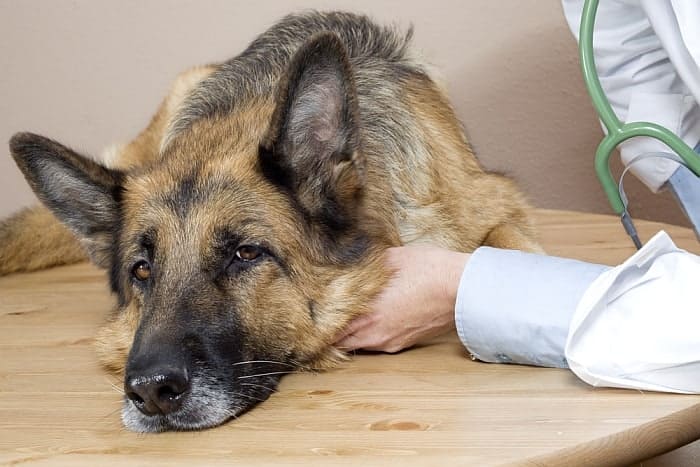Imagining the world through a dog’s eyes, you might wonder, Do Dogs Get Headaches? You can picture their heightened senses and keen awareness of their surroundings. In this complex sensory landscape, one might wonder if dogs, like humans, experience headaches.
This article explores the physiological aspects of canine biology to determine if dogs are susceptible to headaches and what signs and symptoms may indicate their presence.
By examining potential causes, seeking veterinary care, exploring treatment options, and discussing strategies for prevention and management, this article intends to provide valuable insights for dog owners who seek to understand and serve their beloved companions better.
Shedding light on this topic can help foster a more empathetic understanding of our four-legged friends’ experiences and contribute to their overall well-being.
Key Takeaways
- Dogs can experience headaches, and treatment options are available, such as medications and alternative therapies, but it is essential to consult a veterinarian before starting any new treatments.
- A holistic approach to preventing and managing canine headaches includes making lifestyle modifications, reducing stress, optimizing the environment, providing a balanced diet, avoiding triggers, using natural remedies, and ensuring regular exercise and mental stimulation.
- Creating a calming environment for dogs with headaches involves minimizing exposure to stressful situations, establishing a relaxation routine, and incorporating activities for mental and physical relaxation.
- Prioritizing the dog’s overall well-being is vital in preventing and managing canine headaches. It is essential to ensure the pet’s well-being and avoid and manage headaches actively.
- Never give your dog medicine without prescription. Some human drugs like ibuprofen are toxic to dogs.
Do Dogs Get Headaches? Signs and Symptoms

Veterinaries agree that is possible that dogs can experience headaches and they can be identified by observing specific signs and symptoms. A science paper published in 2013 showed that dogs could also experience migraine-like symptoms.
Dog owners must be vigilant and observant to recognize potential signs of headaches in their pets.
Some common signs include:
- Seeking out dark, quiet, or cold places
- Restlessness
- Irritability
- Aggression
- Decreased appetite
- Excessive head shaking.
- Weakness or walking with difficulty
- Not wanting to interact (not wanting to play or be pet)
- Sleeping more than usual
- Head kept low to the ground.
- Glassy eyes, eyelids not fully open
- Walking in circles
Potential Causes of Canine Headaches

One potential cause is environmental factors. Loud noises, strong odors, or weather changes can trigger dog headaches. These external stimuli can overstimulate the dog’s senses and lead to headache-like symptoms.
Another potential cause is certain medical conditions. Head trauma, such as a blow to the head or a concussion, can result in headaches in dogs.
Lastly, various illnesses can lead to canine headaches. Infections or inflammation within the body can cause headaches as a secondary symptom. These underlying health issues can disrupt normal bodily functions and result in headaches for dogs.
Dog owners must be aware of these potential causes and seek veterinary care if their dog is experiencing any extraordinary symptoms. Proper diagnosis and treatment can help alleviate the dog’s discomfort and improve its overall quality of life.
Environmental factors
As we know, dogs have a susceptible auditory system. They hear everything louder than us and can detect ultra high-pitch sounds that we can’t. Therefore, exposure to noisy and chaotic environments, such as a bustling city street or a crowded dog park, may contribute to dog headaches. Canine stress caused by excessive noise levels can trigger headaches, just like it does in humans.
Loud noises can increase anxiety levels in dogs, leading to physiological responses that may result in headache-like symptoms.
These environmental factors can cause discomfort and trigger headaches in some dogs. Dog owners must be aware of their pets’ sensitivity to environmental factors and try to create a calm and peaceful environment whenever possible.
Medical conditions and illnesses
Medical conditions and illnesses in canines can contribute to the development of headaches, such as:
- Sinusitis: Inflammation of the sinuses can result in painful headaches for dogs.
- Dental problems: Dental issues like tooth decay or abscesses can cause headaches due to the associated pain.
- Head Trauma
- Dehydration
- Allergies
- High Blood Pressure
- Brain Tumours
- Seizures
Seeking Veterinary Care and Treatment Options

Whenever your dog presents abnormal symptoms or behavior is always best to speak with a veterinarian. They may conduct diagnostic tests and examinations to determine the underlying cause of the headaches, such as neurological issues or other health conditions. Once a diagnosis has been made, veterinarians may recommend medications and therapies to relieve canine headaches.
They may recommend medications, lifestyle changes, or alternative therapies based on the underlying condition causing the headaches. Consulting a veterinarian ensures that dogs receive proper care tailored to their specific needs, promoting their overall health and happiness while providing peace of mind for their owners.
Diagnostic tests and examinations
Standard diagnostic procedures include:
- Physical examinations
- Blood tests
- Imaging studies such as X-rays or MRI scans in severe cases
These tests help rule out other possible causes of the symptoms and enable veterinarians to focus on specific treatment options for alleviating the headache.
Medications and therapies
Medications and therapies can help in the treatment plan for canine headaches, providing relief and addressing the underlying conditions that contribute to the discomfort experienced by canines.
There are different medications that veterinary can administer to dogs to relieve the symptoms. Never self-diagnose and medicate a dog. Human over-the-counter drugs such as naproxen and ibuprofen are toxic to dogs.
Additionally, veterinarians may recommend alternative therapies to complement or replace traditional medications. These alternative therapies can include acupuncture, chiropractic adjustments, herbal supplements, or massage therapy. While not all dogs may respond equally to these treatments, they offer potential benefits and provide another avenue for managing canine headaches.
And your dog will always appreciate the caresses, kisses, and love you can provide them when feeling down; keep an eye on how your dog reacts on the love you can give her/him, as when feeling sick they might preffer to avoid certain kind of touch.
Preventing and Managing Canine Headaches

Implementing a holistic approach that includes lifestyle modifications, stress reduction techniques, and environmental optimization is essential to prevent and manage canine headaches effectively.
Preventing headaches in dogs can be achieved by providing a balanced diet rich in nutrients and avoiding triggers such as certain foods or loud noises.
Additionally, ensuring regular exercise and mental stimulation can contribute to overall well-being and reduce the likelihood of headaches.
Managing canine headaches involves creating a calm and peaceful environment for the dog and minimizing exposure to stressful situations.
Establishing a routine that promotes relaxation and incorporating activities that promote mental and physical relaxation is essential.
Following these preventive measures and incorporating natural remedies, dog owners can effectively prevent and manage canine headaches while prioritizing their pet’s well-being.
See Also:
- Do Dogs Like Music
- How Do Dogs Get Ringworm
- How Do Dogs Get Heartworms
- Can Dogs Get Hemorrhoids: Symptoms, Causes, & Treatment
- Why Do Dogs Whine? 6 Common Reasons Explained
- Why Do Dogs Sniff Butts: The Secret to Canine Communication
- Why Do Dogs Shake? Causes, Symptoms & Treatments
- Can Dogs Get Colds
- Embark, The Best Dog DNA Test for Unlocking Your Dog’s Genetics?
- Probiotics For Dogs
- The Possibility of Dogs Being Autistic
- Ultimate Guide on How to Get Rid of Fleas on Dogs
Conclusion
While there is no definitive evidence that dogs experience headaches as humans do, they can display symptoms that might suggest discomfort or even point out that they are experiencing migraine-like symptoms. If your dog exhibits unusual behavior or signs of pain, it’s essential to consult a veterinarian to identify and address any underlying health issues promptly.
Why not consider introducing a new member into your family? With adoption, you’re rescuing a life and enriching your own. Show your compassion, make a difference, and start your exciting journey toward adopting a loving companion today.
Visit Bone Voyage Dog Rescue, where love and second chances are just a click away. Because every pup deserves a home

Frequently Asked Questions
How do you tell if a dog has a headache?
Some symptoms of dogs having headaches might include the following:
- Seeking out dark, quiet, or cold places
- Restlessness
- Irritability
- Aggression
- Sensitivity to light or sound
- Decreased appetite
- Excessive head shaking.
- Weakness or walking with difficulty
- Not wanting to interact (not wanting to play or be pet)
- Sleeping more than usual
- Head kept low to the ground
- Glassy eyes, eyelids not fully open
- Walking in circles
What to do when dogs have headaches?
- Provide a peaceful and comfortable resting area for your dog
- Keep other pets and children away to avoid disturbances
- Give the recommended amount of medicine only prescribed by a vet
- Apply mild hot or cold compresses to the neck or back
Do dogs get headaches from barking?
Dogs can get headaches from barking. If they exhibit some of the symptoms of the headache, like restlessness, excessive head shaking, etc., after a barking bout, they are likely getting headaches from barking. If so, consider teaching your dog to stop barking.
Do dogs like to be hugged?
Some dogs like to be hugged, and some don’t. You can always ask the owner if the dog likes hugs, or if the dog is friendly, you can carefully try to embrace the dog and see their raction.
Do dogs like sleeping with their owners?
Yes, dogs like doing so, but it is not ideal for the person’s sleep. The dog can move around at night or bark, disturbing the owner’s sleep. Also, dogs tend to have dirt in their coat, and their fur has allergens. Even if you are not allergic to dogs, the dog’s fur and dirt allergens might interfere with your breathing and, therefore, your brain oxygenation and the quality of your sleep.
